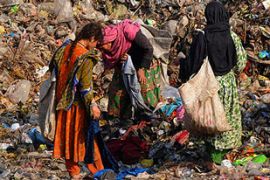Deadly ethnic violence hits Karachi
Clashes between supporters of rival Pakistani political parties bring Zardari to the city.

Those initial killings sparked other attacks in Pashtun areas of Karachi, with ANP politicians reportedly blaming activists from the rival Muttahida Quami Movement (MQM), also a secular party but which represents mostly Urdu-speaking residents of Karachi.
At least 40 people were killed as ethnic clashes erupted across the city in early January.
Asif Ali Zardari, the president of Pakistan, travelled to Karachi on Monday, where he met political leaders from MQM and the ruling Pakistan People’s Party (PPP) to discuss the law and order situation.
Economy fallout
Karachi, which is home to 18 million, holds the country’s central bank and main stock exchange. The city is also the Pakistan’s main industrial base as most foreign companies investing in Pakistan have offices there.
Investors in Pakistan have got used to almost daily violence in the northwest, but bloodshed in Karachi has a more direct impact on financial market sentiment.
An International Monetary Fund loan package of $7.6bn agreed to in November 2008 helped Pakistan avert a balance of payments crisis and shore up reserves.
The IMF increased the loan to $11.3bn in July 2009.
Though Karachi has largely been free of violence over the past couple of years, a bomb that detonated at a minority Shia Muslim procession in late December fuelled concern that the Pakistani Taliban fighters were expanding their fight to the city.
Gangsters and the drug mafia have taken advantage of the tension, officials say, increasing the chances that violence could get worse.
At least 67 people have been killed in political violence in Karachi since the start of 2010, according to police.